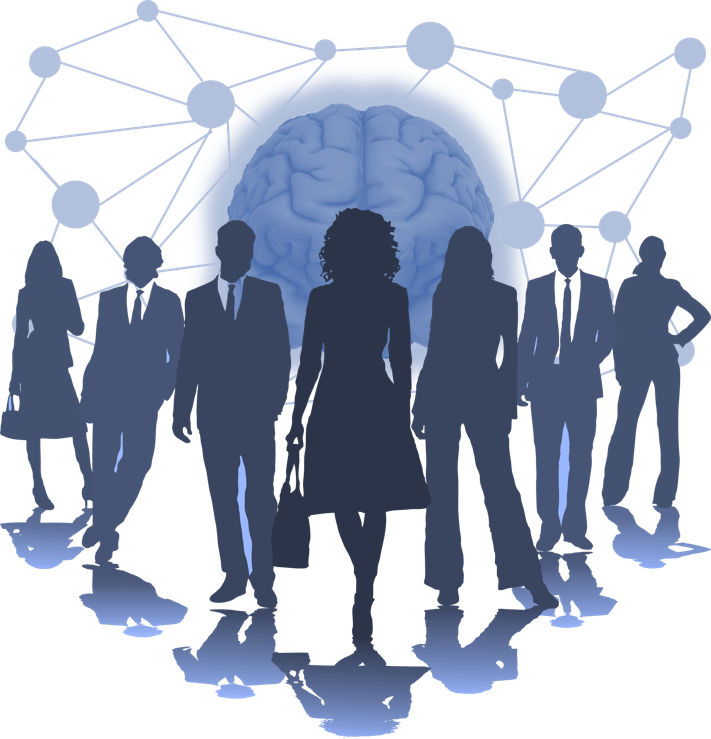Today’s businesses must deal with global complexity and oceans of data while making decisions faster than at any previous time in history. Fortunately, cognitive technologies are maturing just in time to help. Avery Phillips (@A_Taylorian) explains, “Cognitive computing — a term used to describe technological platforms that are based on the concept of artificial intelligence (AI) — is changing the way we do business today. One of the main reasons for this is that AI systems can process information in a significantly smaller amount of time than humans.”[1] Deloitte analysts add, “Cognitive computing has the potential to reshape how work gets done, how businesses grow, and how markets and industries evolve by delivering automated, evidence-based responses that drive better outcomes. … It’s no longer a question of when computers will be able to learn, ‘think,’ and provide reasoned responses. They already can.”[2] Like Deloitte analysts, analysts from Quantzig believe cognitive computing is going to be a major business disruptor. They write, “Today cognitive technology is disrupting the digital sphere unlike any other technology introduced in the past two decades. The main aim of cognitive computing is to assist humans in decision making. This endows humans with superior grade precision in analysis while ensuring everything is in their control.”[3]
What is cognitive computing?
As Phillips noted, cognitive computing rests under the artificial intelligence (AI) umbrella. The term “cognitive computing” was coined by IBM. Ginni Rometty (@GinniRometty), IBM’s CEO, explains the company wanted to find a term more conducive to human/machine collaboration. According to Rometty, AI seeks to match human intelligence whereas cognitive computing seeks to augment human intelligence. She explains, “[When IBM coined the term cognitive computing] the idea was to help you and I make better decisions amid cognitive overload. That’s what has always led us to cognitive. If I considered the initials AI, I would have preferred augmented intelligence. It’s the idea that each of us are going to need help on all important decisions.”[4] As President and CEO of a cognitive computing company, I’m well aware of peoples’ concerns about AI. That’s why I often stress the fact cognitive computing platforms, like the Enterra Enterprise Cognitive System™ (AILA®), are decision aids that let users ask questions and receive answers in language they understand. As decision aids, cognitive platforms provide insights to help decision-makers select informed courses of action when faced with complex and ambiguous choices. Analytics expert Kamalika Some (@KamalikaS) notes, “A cognitive computing system is used in complex situations for ambiguous and uncertain outcomes.”[5] The types of situations in which businesses and humans often find themselves.
Why cognitive computing is a must-have for businesses
An article and infographic published by Ohio University states, “Perhaps the greatest promise offered to businesses today stems from cognitive computing technology. These systems can process unstructured information in ways like humans, but much faster. They understand language patterns and sensory inputs, including text, pictures, and audio. The systems are already improving employee and customer experiences, streamlining new product innovation, enabling health care providers to spend more time with patients, and even saving lives by identifying customer safety issues before they cause accidents.”[6] The article stresses the importance of analyzing unstructured data because, it notes, “80% of all available data are unstructured.” Deloitte analysts agree. They write, “Unlike traditional computer systems that are programmed by people to perform certain tasks, cognitive systems can learn from experience and instruction. The power of cognitive computing is its ability to digest both structured and unstructured data and draw conclusions from it, mimicking the human brain and performing tasks that traditionally only people have been able to do. … Cognitive systems can process information far beyond human capabilities, identifying patterns and providing potential solutions that humans might never recognize through traditional analysis.”
Businesses, however, don’t care what cognitive computers can do per se; rather, they want to know what they can do specifically for them. The staff at Infopulse notes, “Early cognitive computing adopters are already seeing positive results from their investments.”[7] Among the results they note are:
- 65% of those surveyed stated that this technology has become very important in their organization’s success;
- 58% state it is critical to their overall digital transformation strategy;
- 58% say it will be crucial to remain competitive.”
Moreover,” they note, “those pioneering organizations are already experiencing far more customer engagement and growth.” Mitul Makadia (@MarutiTech), Founder of Maruti Techlabs, writes, “According to Gartner, cognitive computing will disrupt the digital sphere unlike any other technology introduced in the last 20 years. By having the ability to analyze and process large amounts of volumetric data, cognitive computing helps in employing a computing system for relevant real-life [challenges].”[8] He suggests three ways cognitive computing can help all businesses. They are:
1. Accurate Data Analysis. Makadia writes, “Cognitive systems are highly-efficient in collecting, juxtaposing and cross-referencing information to analyze a situation effectively.”
2. Leaner & More Efficient Business Processes. “Cognitive computing can analyze emerging patterns, spot business opportunities and take care of critical process-centric issues in real time. By examining a vast amount of data, a cognitive computing system … can simplify processes, reduce risk and pivot according to changing circumstances. While this prepares businesses in building a proper response to uncontrollable factors, at the same time it helps to create lean business processes.”
3. Improved Customer Interaction. “The technology can be used to enhance customer interactions by implementing robotic process automation. Robots can provide contextual information to customers without needing to interact with other staff members. As cognitive computing makes it possible to provide only relevant, contextual and valuable information to the customers, it improves customer experience, thus making customers satisfied and much more engaged with a business.”
Makadia misses the most important benefit cognitive computing offers businesses: Enhancing employee productivity. Rob High observes, “Rather than replacing human minds, the purpose of cognitive computing is to make human cognition even stronger, even better. Cognitive computing enables people to see a perspective they wouldn’t have seen on their own; to recognize something they otherwise would have missed; to help them build an idea; to strengthen their creative processes.”[9]
Concluding thoughts
High observes, “Throughout history, humankind has created technologies that amplified our strengths. As an extension of the strength of our arms, we created the hammer; as an extension of the strength of our backs, the steam engine was born; and as an extension of our intelligence and skills, we created cognitive computing.” By strengthening human capabilities, cognitive computing can strengthen overall business capabilities as well. That’s why cognitive computing is becoming a must-have for businesses.
Footnotes
[1] Avery Phillips, “How AI Is Transforming Business Strategy as We Know It,” insideBIGDATA, 23 August 2019.
[2] Staff, “Artificial intelligence, real results,” Deloitte, 2015.
[3] Quantzig, “Improving the Nature of Business Operations With the Help of Cognitive Computing,” Business Wire, 19 July 2019.
[4] Megan Murphy, “Ginni Rometty on the End of Programming,” Bloomberg BusinessWeek, 20 September 2017.
[5] Kamalika Some, “Leveraging Cognitive Computing for Business Gains,” Analytics Insight, 19 September 2018.
[6] Staff, “Cognitive Computing is Changing Business- Are You Ready?” Ohio University, 2019.
[7] Staff, “How Do Businesses Tap into Cognitive Computing Systems?” Infopulse, 5 July 2019.
[8] Mitul Makadia, “What is Cognitive Computing? How are Enterprises benefitting from Cognitive Technology?” Medium, 10 May 2019.
[9] Rob High, “Amplifying Human Cognition with Cognitive Computing,” Social2Direct, 21 February 2017.





